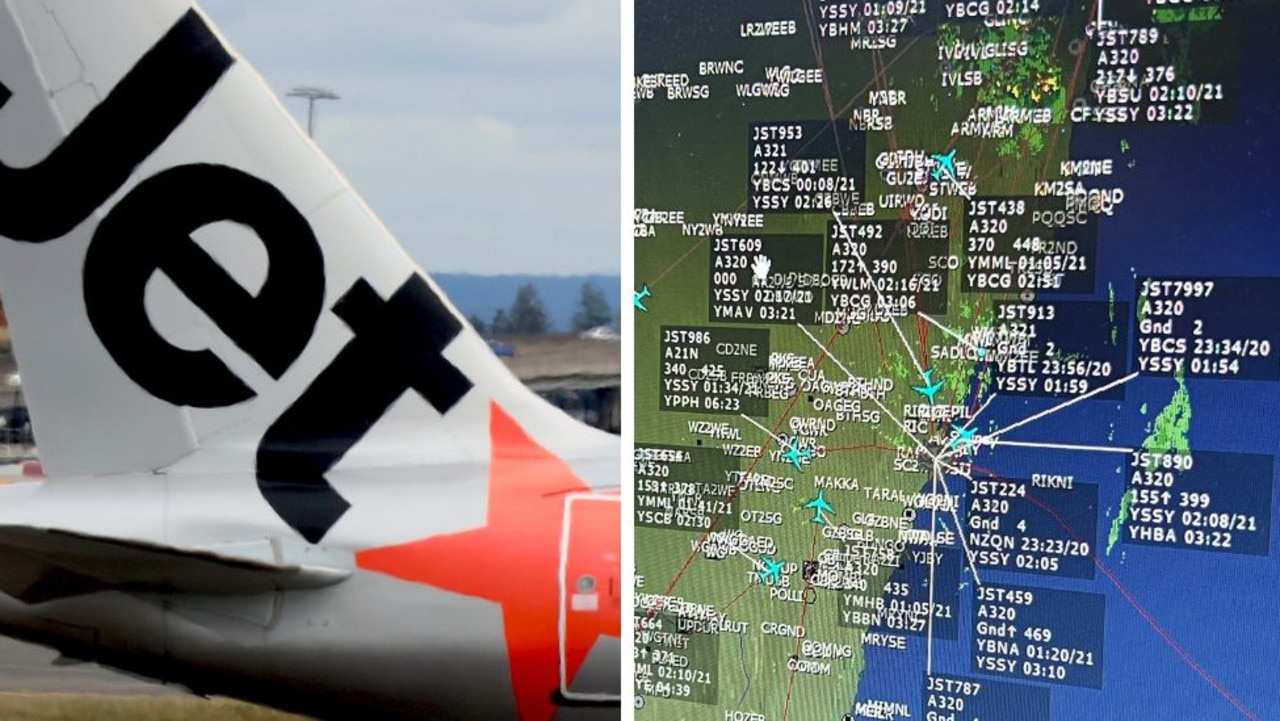As corporate offices across the country empty, about 15 minutes from Melbourne’s CBD one section of an Aussie company’s headquarters is actually buzzing.
Only a few days out from Christmas, eyes are fixed on screens, phones are ringing and the stakes are high.
It is the Jetstar Operations Control Centre, known as the JOCC, and this year the budget airline is readying for its busiest Christmas period ever.
The staff here will be responsible for ensuring an expected 2.4 million travellers get to where they need between December 15 and January 20. On average, there will be almost 400 domestic and international flights a day.
There are teams in charge of monitoring operations (think airport delays or weather disruptions), coordinating crew (like finding replacements for sick staff), overseeing engineering (ensuring an aircraft is safe to fly), flight planning (choosing flight paths and communicating with pilots), and those in charge of telling customers what is going on.
They all work together to complete an ever-changing puzzle that allows hundreds of flights to takeoff and land every day.
Lois May, one of five JOCC managers, has worked there for two decades and says no day is ever the same.
“You can never say when something is going to happen,” she tells news.com.au.
It is Thursday afternoon and as we speak, they have just been informed air traffic control is running a ground delay program at Brisbane Airport, which instructs aircraft to wait on the ground for their turn to depart because of air traffic congestion at the airport. It means all flights to Brisbane will be delayed.
On top of that, they have been told there is air traffic controller shortages at Sydney Airport with all flights out of Sydney delayed at least 30 minutes.
Staff at the JOCC know they are in for a busy afternoon and evening because that one issue at Australia’s busiest airport can snowball into huge delays.
It could cause queues at runways, crews could reach the maximum hours they are allowed to work, and then delayed flights may run into issues with airport curfews in Sydney, Gold Coast and Adelaide.
Ms May said the one thing she wished the average person knew was the incredible time and effort it takes for them to work out a plan to best suit their customers.
Nick Tajudin, who oversees the whole operation, said the JOCC is better prepared then it ever has been to deal with this record-breaking festive season.
He explained there were many factors that could cause delays and cancellations including weather, engineering, crew late to aircraft or sickness, but the airline had taken steps to reduce those risks.
Aircraft maintenance was brought forward, there is four spare narrow-body aircraft and one wide-body on standby across the network, and more people on the ground.
“When we came out of Covid there was a lot of fresh staff, different faces [and] it was a very tricky environment because we were trying to increase our flights very quickly and we were struggling to deliver,” Mr Tajudin said.
“Now, even though we still have a somewhat green workforce, what’s happened is you can see a fundamental change in how they’re responding. We’re delivering better on-time performance, our cancellations are dropping, we’re not at a high-fiving moment yet but we’re all celebrating the success we’ve had over the last few months.”
Jetstar beat out Qantas and Virgin Australia when it came to having the highest percentage for on-time arrivals and lowest level of cancellations last month, the latest figures from the Bureau of Infrastructure and Transport Research Economics showed.
Mr Tajudin wants passengers to know if they are disrupted there is a huge team working 24/7 to find solutions, and the communications they receive are not from a bot but real life people, who sit among all the other decision makers.
“We have a delay right now for a Sydney to Brisbane service, [the JOCC customer team] will go in to a communication system we use, they will press a button,” he explained.
“Some of [the text messages] are scripted, already predefined for them, and some ad hoc, which we will write and share with our customers to make sure they know we are focused on them and getting them underway.”
The staff also follow a predetermined policy on what they offer customers during disruptions, such as rebooking flights, travel or meal vouchers, refunds and covering accommodation. This policy is more generous during peak periods like Christmas.
From Friday through to Christmas Eve on Sunday, the JOCC will co-ordinate flights for 70,000 to 72,000 travellers each day.
But Jetstar’s busiest day over the holiday season will actually be January 2, followed by January 5, and December 29 and 30.
For the Qantas Group, including Qantas and Jetstar, the busiest day was Friday, December 15, with more than 150,000 passengers.
More than 8.5 million people are due to fly on Qantas and Jetstar services in December and January across almost 70,000 flights, which is more than half a million more people than the same time last year. It is the most passengers since the 2019-20 festive season.
Mr Tajudin said it is actually a time of year JOCC staff look forward to, with Ms May adding they thrive on the adrenaline rush of solving problems.
The staff, who work 12 hour shifts, each have key performance indicators and the overall goal is impossible to ignore, with a screen in the centre of the room displaying the airline’s on-time performance (OTP) in real-time.
Jetstar aims to have OTP above 70 to 75 per cent and cancellations under three per cent.
Mr Tajudin said they would love to have their OTP in the 80s but they are “not there yet”.





